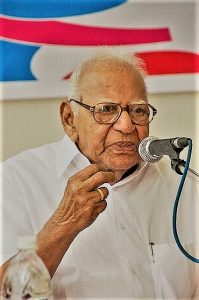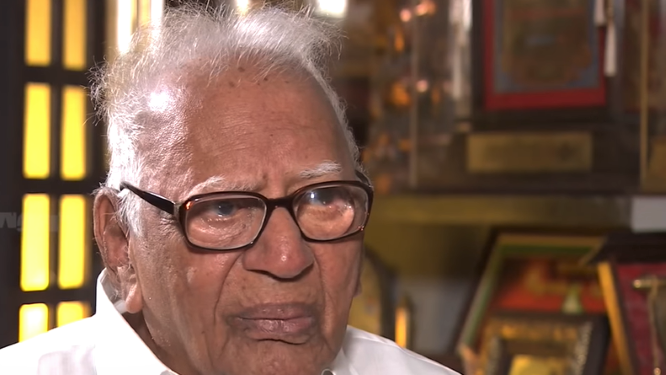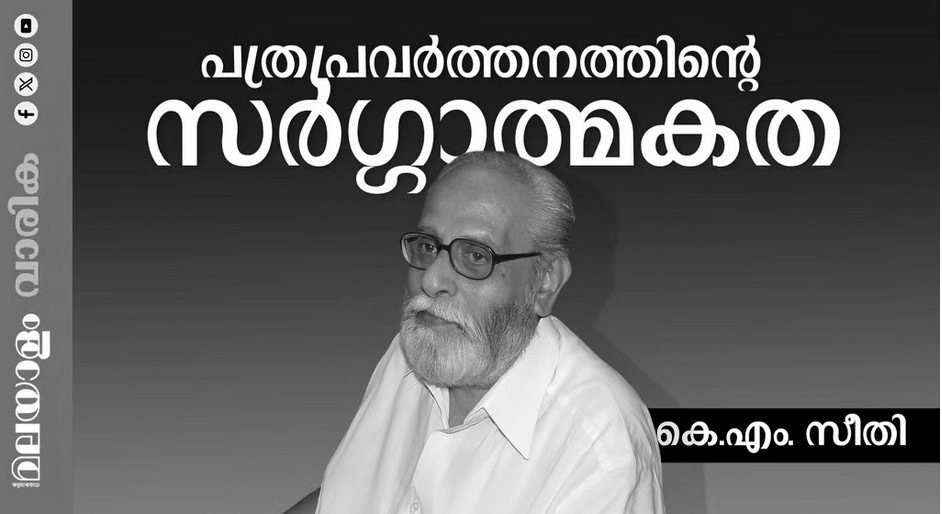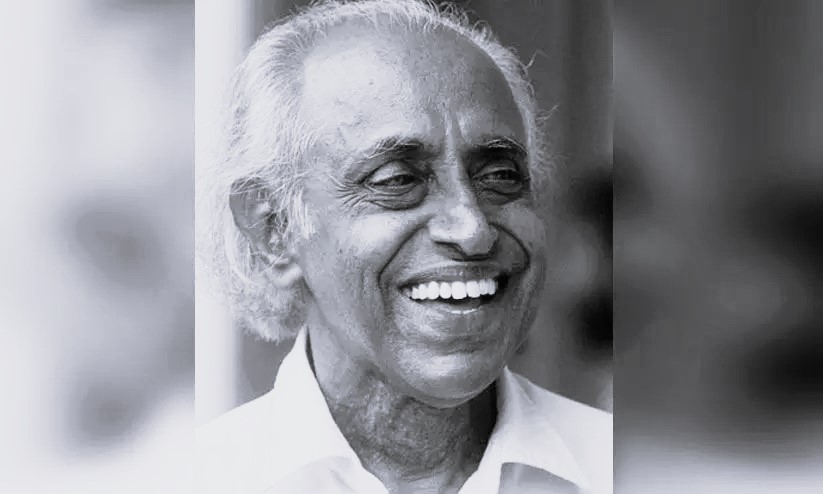A travelling memory with V.R. Krishna Iyer—a maverick Indian jurist with an array of intellectual attributes—still remains fresh and keeps me awestruck even after two decades. In our conversation, he was sharing some nostalgic thoughts about his staying in a house in Thalasseri, Kerala where my grandfather (K.M. Seethi Sahib) had also lived for some time. Both Krishna Iyer and Seethi Sahib continued their legal practice in Thalasseri in the 1930s and early 1940s. They were also elected to Madras Legislative Assembly before they got elected to the Legislative Assembly of Kerala. The memories he shared went beyond the differences in their political orientation, but brought in great moments of their intellectual respect for each other. Later, Seethi Sahib’s son-in law (M.M. Abdul Kadir) became his associate and colleague in the apex court (he repeated these things in his foreword to the biography of K.M. Seethi Sahib Navothana Samskrithiyude Speaker authored by K.M. Althaf, just before his demise). Krishna Iyer’s visits to Mahatma Gandhi University—in connection with the conferences we organised three or four times—refreshed those reminiscences. Each of those deliveries had a unique appeal, with the academics gathered from different parts of India and abroad listening to him with great reverence for his erudition. Indeed, Krishna Iyer was a legendary figure not only in jurisprudence, but in every social sphere he traversed.
Krishna Iyer was one of those rare geniuses who envisioned the future of the nation through a social justice prism. It might seem a strange coincidence that in less than 24 hours after the Supreme Court of India decided to have a social justice bench, this messiah of the oppressed masses bid farewell to the world—on 4 December 2014. Perhaps Iyer’s long-lasting wish got materialized albeit in his absence. India surely does not have a long list of such legal luminaries who would make a claim that post-retirement life is a life with a mission. For him, this mission was a “vigorous wonder of pursuits of public causes willing to battle against harsh ground realities and die-hard social injustices.”
Justice Iyer, who died a few months before his 100th birthday on 4 December 2014, carried the stature of the British jurist Lord Alfred Denning. Denning also died a few weeks after his 100th birthday. One wonders if Justice Iyer also had fallen in line with Lord Denning’s thinking that “limitation is not a matter of justice” but “a rule of public policy which has its origin in history and its justification in convenience.” Denning was only underscoring the critical role of jurisprudence. But Iyer extended it to a wider realm of social intervention. Fali S. Nariman, a senior advocate to the Supreme Court, once said that “if ever innovative judgments are permitted to be patented, Lord Denning in England and Krishna Iyer in India would be the judges holding the largest number of such patents.”
Justice Iyer began his professional life way back in 1938 in the erstwhile Malabar, which was then under the Madras High Court. An active public intellectual that he was, Iyer could not but become a “moral rebel against human injustice.” Within a short time, Justice Iyer emerged as a leading lawyer with a sharp but critical social insight into both civil and criminal laws. His advocacy of the poor and downtrodden later got him into trouble. For a month in May 1948 he was in police custody and prison with invented charges. This did not detract him from coming into close contact with progressive and revolutionary leaders of the time. Iyer’s interventions in aid of the nationalist cause, striking workers and struggling peasantry also earned him a name in a wider political realm.

Public interest questions continued to attract his attention in spite of the professional commitments. This led to his victory as an independent candidate from Tellicherry during the elections to the Madras Legislative Assembly in 1951. Iyer’s shift from judiciary to legislature strengthened his acumen and thereby helped master the art of parliamentary discourses. He realized then and thereafter the importance of the legislative process for social transformation. His election to the Kerala Assembly in 1957 was a turning point. By becoming a minister in charge of home, law, justice, prisons, social welfare etc. under the EMS Ministry, Iyer positioned himself as part of the executive. However, the dismissal of the EMS Ministry was a decisive moment for him. Having returned to his profession in August 1959, Justice Iyer earned a reputation as one of the leading lawyers of the state. Though contested again in the elections held in 1965, he was defeated. This transformed his course of engagements; yet Iyer chose to remain in public life with his renewed vigour in the legal profession. As a lawyer he excelled in diverse spheres, besides being the champion of the oppressed and marginalised classes. As a public intellectual he held several positions in the people’s organizations, arts societies, sports councils, and cultural groupings. This included his position in the SPCA, All India Peace Council, Indo-Soviet Cultural Society (ISCUS), Indo-GDR Friendship Society, anti-imperialist forum, Human Rights organizations and councils, workers’ and peasants’ movements, and the list could be much longer.
Iyer’s championing of the construction workers, fighting for the rights of the Dalits, women, children, aged, and ailing constituted his social world of critical engagements. Krishna Iyer was also vehement in his criticism of the legal system in place for the poor and downtrodden. He said: Our legal system, including the police, is anti-Dalit and anti-poor. The death penalty laws’ wrathful majesty, in blood-shot equality, deals the fatal blow on the poor not the rich, the pariah not the brahmin, the black not the white, the underdog not the top dog, the dissenter not the conformist. . . The law barks at all but bites only the poor, the powerless, the illiterate, the ignorant.
In a landmark judgement, which was Iyer’s last judgment (AIR 1981 SC 298), he said: “The abolition of slavery has gone on for a long time. Rome has also abolished slavery, America abolished it, and we did, but only the words were abolished, not the thing” (Para I). Elsewhere in the judgment, he said: “Given the opportunity and the environment, the Indian Dalits can make India great, and give up crutches (Para 104 of the judgement). In his Dr Ambedkar and the Dalit Future, Iyer described in detail the miserable condition of the untouchables and depressed classes in India and the remarkable work done by Dr. Ambedkar for their uplift. Commenting on gender quality and sex discrimination in the case of Miss C.B. Muthamma, I.F.S. vs. Union of India and others (1979/ 4 SCC 260) Krishna Iyer wondered “whether Articles 14 and 16 belong to myth or to reality.” In the judgment, he said there was ‘transparent discrimination’ against women in the foreign service rules.
Iyer’s stature grew considerably when he became a member of the Law Commission. As chairman of the expert committee on free legal aid to the poor, he brought out a report which became the first comprehensive free legal aid document in India. Iyer’s change of role from the Law Commission to the Supreme Court (1973-1980) became a significant trajectory in the Indian jurisprudence. His democratic credentials apart, the people-oriented/social justice-oriented verdicts of Iyer made him a jurist extraordinary in the annals of Indian legal system. Perhaps the nation never witnessed a stature of this sort before when he performed multifunctional roles in the legislature, executive and judiciary.
The most challenging legal-political question Iyer ever addressed in his tenure was the one related to Indira Gandhi when she was disqualified by the Allahabad High Court. The appeal petition was handled by Iyer in the most careful manner which brought him fame years later. Though national emergency was the natural outcome of this judicial dispensation, it subsequently raised several questions of constitutionality, fundamental rights and democratic propriety on which Justice Iyer had his firm position. Iyer’s most enduring advocacy of the rights of the under-trial prisoners resulted in fundamental changes in the jurisprudence of bail. Public interest litigation, jail reforms etc were the other subjects on which he had a distinctly different vision.
Similarly, abolition of death penalty was the constant theme of his endeavour in the regime of human rights. Iyer argued that no civilized state had any “authority to inflict death penalty even in the rarest of rare cases, lest it be condemned as guilty of barbarity and devoid of humanity.” He used to remind his colleagues that the “universal respect for Human Rights commands absolute abolition of capital punishment” as no state “can stultify or demolish the right to life of any human being.”
His social intervention agenda never missed any critical subjects of contemporary concern. Iyer was so sceptical of nuclear programmes all over the world and argued that the “high priests of the nuclear religion are specialists in the art of misleading public opinion.” While supporting the people’s agitation in Koodankulam, he wrote to the Chief Minister of Tamil Nadu requesting her to put the programme on hold and address the concerns raised by the local people. Likewise, his advocacy of the rights of the Tamils in Sri Lanka led him to call the IPKF as “Indian Peace ‘Killing’ Force” and saw the 1987 Indo-Sri Lanka Accord as fundamentally flawed. The people of Kerala always looked upon Justice Krishna Iyer as the voice of ingenuity and wisdom. They will remember him for having played a leading role in the Kerala Land Reforms Act, 1963, a legislation that changed the state’s socio-political landscape (though there were some allegations that he ‘somehow managed’ his own property).
Iyer’s powerful lexicon had always sustained the sharpness of a social weapon which he used with care and commitment. Even in the last days in ‘Sadgamaya’, his mind appeared to be that of a conscious-social critic. Krishna Iyer is being remembered as the voice of the voiceless, the inveterate defender of human rights, and the trail blazer of social liberation through unceasing secular democratic struggles.
Immanuel Kant once wrote: Everything in the world has either a price or a dignity. As we cease to see human beings as akin to things in the natural world, and construe them as akin to machines, we abandon dignity in favour of price: we lose a sense of distinctly human value, and reduce everything to instrumental value, forgetting that where everything has instrumental value, nothing has dignity at all. If anyone in the Indian jurisprudence had so passionately adhered to this Kantian notion, it was none other than Justice V.R. Krishna Iyer. Unquestionably, Iyer belonged to this genre of jurists who respected human dignity as much as the dignity of the natural world.
It appeared in Global South Colloquy, 4 December 2020
An early version of this write-up had appeared in Tehelka, 20 December 2014.





Congrats for timely tribute to Justice V R Krishna Iyer who was proud son of Kerala.